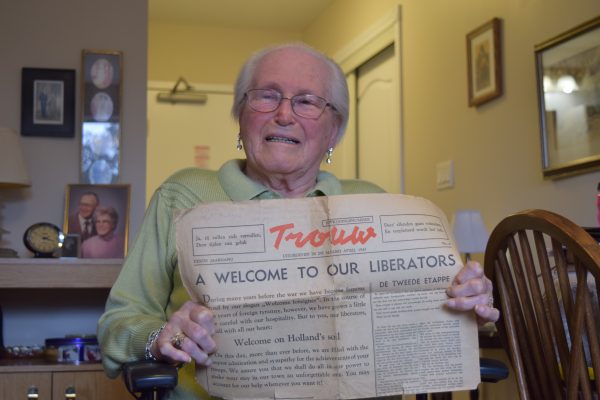
By Tristan Marks
NewsNow
Engelina Hummel was only 11 years old when her native Netherlands was invaded by Germany. It was 1940 when she first put pen to paper to write her account of the Second World War. She could not have foreseen the hardships and misery the next four years would bring to her world.
Nor could she have seen the series of coincidences that would lead to her unadulterated accounts of the war being rediscovered and recognized for their importance to history.
THE DISCOVERY
Eighty years later, Engelina, 91, lives in Grimsby’s Maplecrest Village. She kept the diaries all through the years, but was growing worried about what would happen after she was gone.
“I just had them laying in the chair in my room,” said Engelina. “I was worried that someone would throw them out.”
The diaries were written in Dutch on 1940s-era school notebooks. Engelina was worried that someone would mistake the journals for trash as they deteriorated over the decades.
Enter Ken Watson, a Hamilton-based author and amateur historian. Maplecrest invited him to talk about an up-coming book and encourage the residents to write their own memoirs.
“He was asking us if any of us had thought of writing a diary,” said Engelina. “I raised my hand and told him I already had one.”
Watson said he “had to see it” after learning about Hummel’s story.
“I never thought I’d see something like this,” said Watson. “It was an uncensored, documented account of the war. It was like finding Anne Frank’s diary.”
INVASION
“It was a very bad time,” Engelina said, describing the general mood all those years ago leading up to the German invasion. Hummel said her family lived close to the border with Germany near Groningen, in the Netherlands. Rumours abounded of an upcoming war with German and many hoped their country could stay neutral as in the previous world war.
Any illusions were shattered on May 15, 1940, when word of the invasion spread.
“I thought that I’d sit down and write a book about the war,” said Engelina. “Of course, I was too young to write a whole book, so I kept a diary instead.”
“I was always a writer,” she continued. “And my mother also told me to write it all down.”
Watson pointed out that this must have been “a huge vote of confidence” in Engelina Hummel’s 11-year-old writing skills. Recording the war was enough to be charged with spying by the Nazis, a charge with one punishment: death.
This was something Engelina and her family knew all too well. Many of her cousins were executed by the Nazis.
“I would hide my diaries in a hole,” Engelina said. “We couldn’t let the Germans find it.”
YEARS OF MISERY
Hummel’s diaries account all the trials and struggles her family faced during the war. The troubles began from day one, as collaborators among the Dutch National Socialist Movement (NSB) aided and abetted the incoming Germans.
“The first thing they did was take our bikes,” Engelina recounted. “Can you imagine that? Holland was a biking country and the first thing they did was take our bikes.”
Many entries record the sounds and sights of battles she witnessed, including an airplane dogfight. “I had never seen an airplane before,” Engelina said. “One day a plane came very close to my home. The other kids and I tried to follow it, when we suddenly heard a loud boom!” The plane crash landed in a nearby farmer’s field.
LIBERATION
“I have had many happy days in my life,” said Engelina. “And that was one of them, when we were liberated.”
The day began like any other at first.
“It was a rainy morning when a girl rode by on a bike and said something,” Engelina explained. “Later that night we listened on the radio and heard the invasion had happened.”
Liberation “came slowly, but surely.”
By the end of September 1944, the Allied army, led largely by Canadians, pushed the German army out of the Netherlands. Nearly a year later, the war would be over.
It is at that point that Engelina’s diaries end.
After the war Engelina eventually married and moved to Canada when she was 30. The rest, as they say, is history.
THE MUSEUM
After seeing the diary, Watson said he knew it was a significant piece of history.
With permission, Watson began photocopying the pages of the diaries to preserve them.
Shortly thereafter, Watson made a trip to Amsterdam in the Netherlands. While there, he came to hear about the Verzetsmuseum, a museum in the city dedicated to the lives and stories of the Dutch resistance movement in WWII.
Seeing a chance to have Hummel’s diaries preserved by professionals, Watson contacted the museum.
“I got a meeting with the curator and he was ecstatic about the opportunity,” said Watson. “To find them so receptive in Amsterdam was like hitting a homerun. ”
With Engelina’s consent, the diaries will be sent to the Verzetsmuseum to be displayed in their collection and digitized.
Engelina, for her part, remains humble and modest.
“I just wanted to report on the war and I did,” she said. “I never thought I’d get all this attention.”

